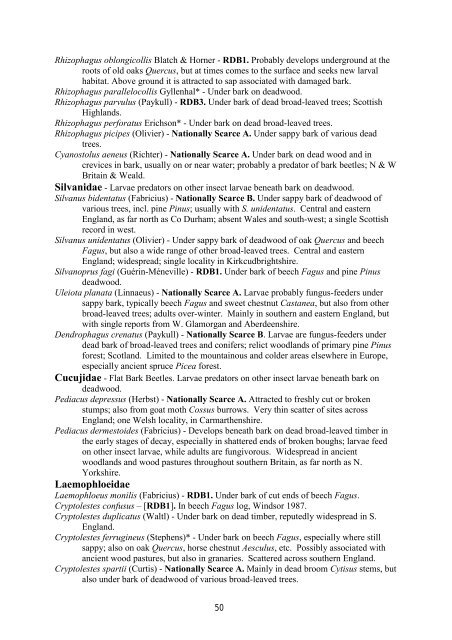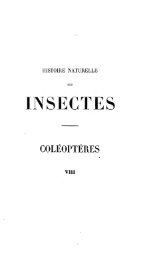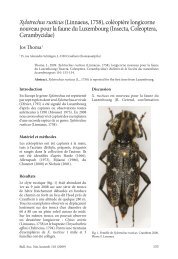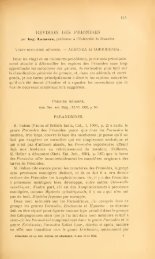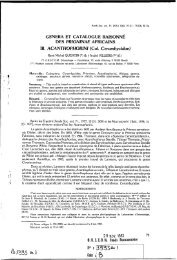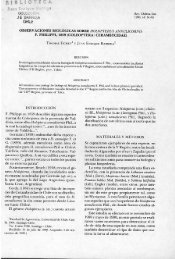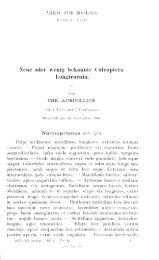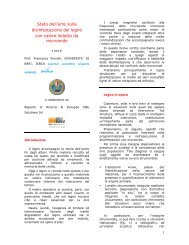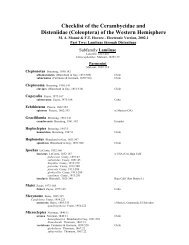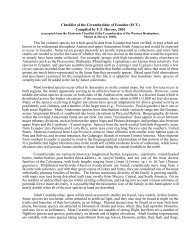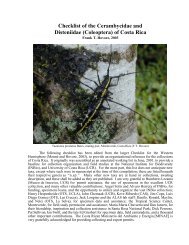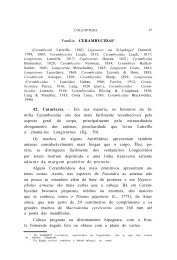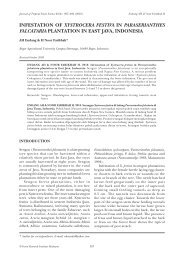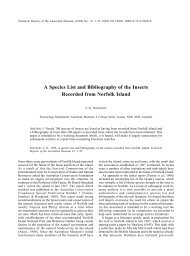Crustacea: Copepoda - Cerambycoidea.com
Crustacea: Copepoda - Cerambycoidea.com
Crustacea: Copepoda - Cerambycoidea.com
You also want an ePaper? Increase the reach of your titles
YUMPU automatically turns print PDFs into web optimized ePapers that Google loves.
Rhizophagus oblongicollis Blatch & Horner - RDB1. Probably develops underground at the<br />
roots of old oaks Quercus, but at times <strong>com</strong>es to the surface and seeks new larval<br />
habitat. Above ground it is attracted to sap associated with damaged bark.<br />
Rhizophagus parallelocollis Gyllenhal* - Under bark on deadwood.<br />
Rhizophagus parvulus (Paykull) - RDB3. Under bark of dead broad-leaved trees; Scottish<br />
Highlands.<br />
Rhizophagus perforatus Erichson* - Under bark on dead broad-leaved trees.<br />
Rhizophagus picipes (Olivier) - Nationally Scarce A. Under sappy bark of various dead<br />
trees.<br />
Cyanostolus aeneus (Richter) - Nationally Scarce A. Under bark on dead wood and in<br />
crevices in bark, usually on or near water; probably a predator of bark beetles; N & W<br />
Britain & Weald.<br />
Silvanidae - Larvae predators on other insect larvae beneath bark on deadwood.<br />
Silvanus bidentatus (Fabricius) - Nationally Scarce B. Under sappy bark of deadwood of<br />
various trees, incl. pine Pinus; usually with S. unidentatus. Central and eastern<br />
England, as far north as Co Durham; absent Wales and south-west; a single Scottish<br />
record in west.<br />
Silvanus unidentatus (Olivier) - Under sappy bark of deadwood of oak Quercus and beech<br />
Fagus, but also a wide range of other broad-leaved trees. Central and eastern<br />
England; widespread; single locality in Kirkcudbrightshire.<br />
Silvanoprus fagi (Guérin-Méneville) - RDB1. Under bark of beech Fagus and pine Pinus<br />
deadwood.<br />
Uleiota planata (Linnaeus) - Nationally Scarce A. Larvae probably fungus-feeders under<br />
sappy bark, typically beech Fagus and sweet chestnut Castanea, but also from other<br />
broad-leaved trees; adults over-winter. Mainly in southern and eastern England, but<br />
with single reports from W. Glamorgan and Aberdeenshire.<br />
Dendrophagus crenatus (Paykull) - Nationally Scarce B. Larvae are fungus-feeders under<br />
dead bark of broad-leaved trees and conifers; relict woodlands of primary pine Pinus<br />
forest; Scotland. Limited to the mountainous and colder areas elsewhere in Europe,<br />
especially ancient spruce Picea forest.<br />
Cucujidae - Flat Bark Beetles. Larvae predators on other insect larvae beneath bark on<br />
deadwood.<br />
Pediacus depressus (Herbst) - Nationally Scarce A. Attracted to freshly cut or broken<br />
stumps; also from goat moth Cossus burrows. Very thin scatter of sites across<br />
England; one Welsh locality, in Carmarthenshire.<br />
Pediacus dermestoides (Fabricius) - Develops beneath bark on dead broad-leaved timber in<br />
the early stages of decay, especially in shattered ends of broken boughs; larvae feed<br />
on other insect larvae, while adults are fungivorous. Widespread in ancient<br />
woodlands and wood pastures throughout southern Britain, as far north as N.<br />
Yorkshire.<br />
Laemophloeidae<br />
Laemophloeus monilis (Fabricius) - RDB1. Under bark of cut ends of beech Fagus.<br />
Cryptolestes confusus – [RDB1]. In beech Fagus log, Windsor 1987.<br />
Cryptolestes duplicatus (Waltl) - Under bark on dead timber, reputedly widespread in S.<br />
England.<br />
Cryptolestes ferrugineus (Stephens)* - Under bark on beech Fagus, especially where still<br />
sappy; also on oak Quercus, horse chestnut Aesculus, etc. Possibly associated with<br />
ancient wood pastures, but also in granaries. Scattered across southern England.<br />
Cryptolestes spartii (Curtis) - Nationally Scarce A. Mainly in dead broom Cytisus stems, but<br />
also under bark of deadwood of various broad-leaved trees.<br />
50


